Syria has handed over the last of its declared stockpile of chemical weapons, which will be destroyed at sea over the next two months, the UN's chemical weapons watchdog has said.
The Organisation for the Prohibition of Chemical weapons (OPCW) announced that the final 8% of Syria's acknowledged arsenal of chemical weapons and precursors had been loaded on to a Danish freighter.
The ship, the Ark Futura, is now sailing to the Italian port of Gioia Tauro for a rendezvous with an American vessel, the MV Cape Ray, which is specially equipped to neutralise the most dangerous of the chemical agents at sea.
"The mission to eliminate Syria's chemical weapons programme has been a major undertaking marked by an extraordinary international cooperation," said Ahmet Uzumcu, the OPCW's director-general. "Never before has an entire arsenal of a category of weapons of mass destruction been removed from a country experiencing a state of internal armed conflict. And this has been accomplished within very demanding and tight timeframes."
However, Uzumcu added that the OPCW was not in a position to certify that Syria no longer had any chemical weapons. The materials removed were those that the regime had declared.
Western governments claim to have intelligence suggesting that Damascus has not admitted to all its chemical arms. An OPCW investigation team has found evidence that chlorine gas was used against civilians in recent months "in a systematic manner", but the team has been unable to reach the site for further investigation because it came under attack.
Possession of chlorine is not a violation of the chemical weapons treaty, as it is a commonly used chemical, so Syria was not required to list chlorine on its declared inventory. But its use as a weapon is a violation of international law.
"While a major chapter in our endeavours closes today, OPCW's work in Syria will continue," Uzumcu said. "We hope to conclude soon the clarification of certain aspects of the Syrian declaration and commence the destruction of certain structures that were used as chemical weapons production facilities."
The delicate operation to remove Bashar al-Assad's declared chemical stockpile overran significantly. The deadline laid down by the UN security council for the complete destruction of all Syria's chemical agents was 30 June, but that will be missed by about two months.
The Cape Ray, a 648ft converted car ferry, has been waiting at the Spanish port of Rota for four months for the extraction of chemical weapons from Syria to be completed. After taking custody of the cargo in Italy, it will take the US chemical weapons specialists on board about 60 days, depending on sea conditions, to complete the neutralisation of sulphur mustard blistering agent and DF, a dangerous precursor to sarin nerve gas, using two hydrolysis units bolted to the Cape Ray's vast cargo deck. The Syrian government told the OPCW that the last batch of chemicals had been in a military base in territory being fought over in the country's civil war, and that it therefore took more time than expected to transport it to a staging area east of Damascus where it was sealed, verified and repackaged under OPCW oversight before being driven to the Syrian port of Latakia for loading on the Ark Futura.
After hydrolysis is completed, the Cape Ray is due to sail to Ellesmere Port, in Cheshire, where about 150 tonnes of effluent from the DF precursor will be unloaded for incineration by the French-based environmental services corporation Veolia.
A second freighter, the Norwegian ship Taiko, is taking 500 tonnes of less dangerous, priority two chemicals from Latakia straight to Finland and then to Port Arthur in Texas, for destruction in commercial facilities.
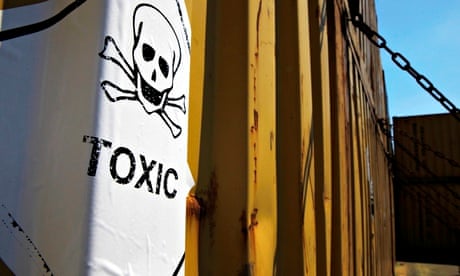


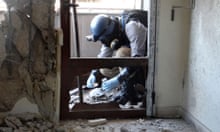
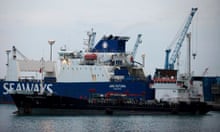
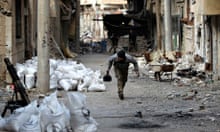
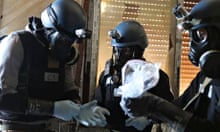
Comments (…)
Sign in or create your Guardian account to join the discussion